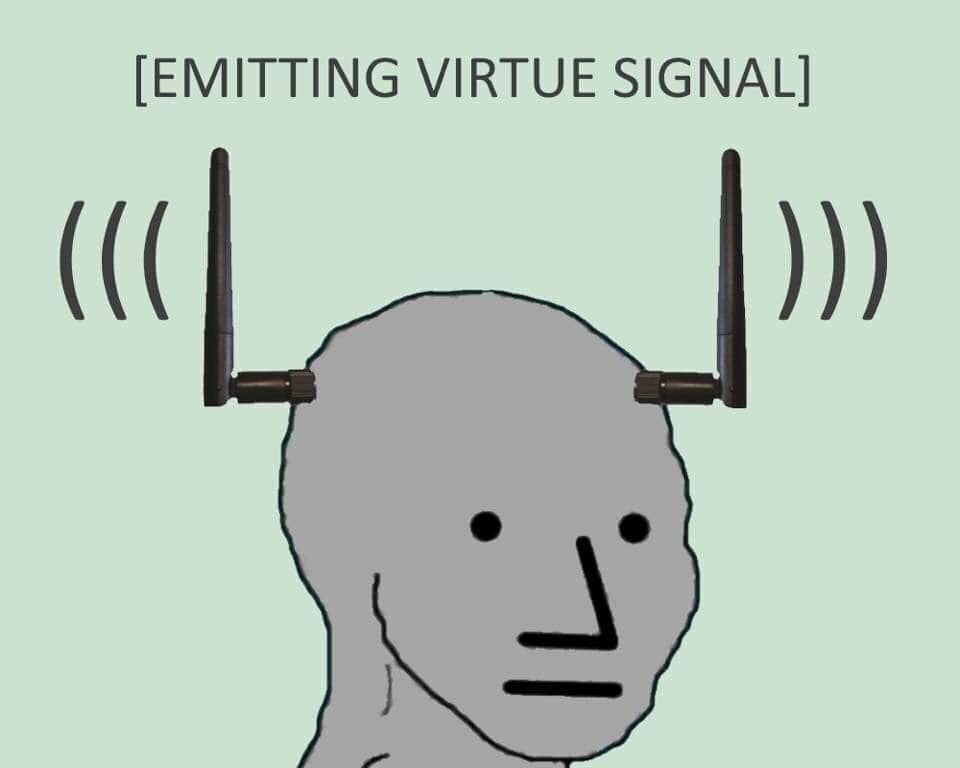
Anyone spending any time in social forums recently will have observed people making passionate defences of mass Muslim immigration, of ten-year old drag queens or of transfaggotry, despite not really believing in the truth of their own assertions. This behaviour might seem strange, or even paradoxical. But it’s a long-observed behavioural pattern known as virtue signalling.
In short, virtue signalling is when you show off how wonderful you are. In Clown World, this usually manifests as an overt attempt to communicate one’s moral rectitude to other people.
It’s originally a biological term referring to the efforts of male suitors to impress potential breeding partners. Being well-groomed and smelling good is a way of demonstrating one’s physical health to females. So is performing vigourous physical activity, or posing in a way that displays one’s muscles. These actions signal one’s physical virtue and suitability as a breeding partner.
In the discourse of Clown World, virtue signalling refers to the ubiquitous moral grandstanding that has infected public discussion. In everyday conversation today it’s normal for people, instead of contributing to an exchange of knowledge, to promote themselves as a moral authority. This phenomenon is especially acute on social media and at universities.
In practice, there are three forms of virtue signalling in Clown World.
The first is the aforementioned biological one, of trying to demonstrate one’s genetic quality through superior health and conditioning. When a man raises a curled arm with clenched fist to show off his biceps, or when a woman grows her hair long to show off her youthful vigour, it’s virtue signalling. Although these behaviours happen in Clown World, they are not what is usually meant when ‘virtue signalling’ is used as a pejorative.
The second form is intellectual. The most common expression is using unnecessarily large or uncommon words when speaking or writing. The purpose of doing so is to ascend the intellectual dominance hierarchy by intimidating lesser minds. Although this also happens in Clown World, it’s also not what is usually meant by ‘virtue signalling’.
The third form is moral. This moral grandstanding is usually associated with political and religious figures. It involves presenting oneself as if one possessed a more sophisticated, more refined, more educated moral sense. In Clown World, this third form of virtue signalling is extremely common. When Clown Worlders refer to virtue signalling, they’re probably referring to this.
Am important corollary to this third form is that the virtue signaller does precisely fuck-all about solving the issue they’re beating their chests over. Even when presented with an easy opportunity to help, they will not take it. Actions risk going wrong and lowering one’s social standing – by comparison, virtue signalling is risk-free.

Understanding this form of virtue signalling is essential if one wants to understand Clown World behaviour. It’s so common today that, in 2019, the brilliant American psychologist Geoffrey Miller was able to write an entire book about it.
Virtue signalling is especially common among gutmenschen, baizuos, simps, soyboys, dhimmis and Social Justice Warriors. The undisputed king of virtue signalling, however, is the Christcuck. The Christcuck’s entire gambit is to present himself as a moral authority of such distinction that everyone else is obliged to submit to his instruction.
The origins of virtue signalling, in a human context, reflect our social origins. In the biological past, when we lived as tribes, human societies were more like criminal gangs. If one got offside with the wrong people, one could get ostracised, which probably meant death. Because of resource scarcity and the ever-present threat of famine, people have always needed to get other people to think of them as valuable.
Human societies, whether they admit it or not, are all obsessed with the question of which individuals are the most valuable. This is true from the village to the imperial level. It seems to be hard-wired into the human brain to both rank other people in terms of value, and to strive to be seen as higher value.
All forms of virtue signalling are intended in increase the social position of the signaller. The purpose of loudly proclaiming virtue is that other people will see you as a moral authority.
Intelligent people correctly understand virtue signalling to be a sign of weakness. In practice, high-value people don’t need to virtue signal, because their value is either clearly apparent to everyone, or other people make it apparent to everyone. This is the reason why most professional workers dress without ostentation.
Anyone who does virtue signal, then, is probably low-value. If they weren’t, they’d let their own actions do the talking.
Dumb people, on the other hand, believe that virtue signalling increases their social standing. They are so anxious about being seen as moral authorities, or at least with not being seen as moral reprobates, that they can’t resist a chance to talk themselves up. The act of talking up one’s moral qualifications is the essence of virtue signalling.
Virtue signalling is not going away, because resources are becoming scarcer, and this will intensify the fear of getting ostracised. Also, globalisation has led to steeper and steeper social dominance hierarchies, which require ever-more effort to ascend. Worst of all is the opportunity afforded by social media to effortlessly virtue signal to more and more people.
*
This article is an excerpt from Clown World Chronicles, a book about the insanity of life in the post-Industrial West. This is being compiled by Vince McLeod for an expected release in January 2021.
*
If you enjoyed reading this essay, you can get a compilation of the Best VJMP Essays and Articles of 2019 from Amazon for Kindle or Amazon for CreateSpace (for international readers), or TradeMe (for Kiwis). A compilation of the Best VJMP Essays and Articles of 2018 and the Best VJMP Essays and Articles of 2017 are also available.
*
If you would like to support our work in other ways, please consider subscribing to our SubscribeStar fund. Even better, buy any one of our books!
